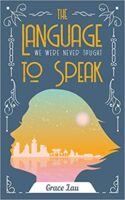Visible & Invisible Identities of Immigrant Life
The Language We Were Never Taught to Speak debut poetry collection by Grace Lau, is an intensive attempt in discovering concealed elements of immigrant inheritances, queer yearnings, and multi-generational mysteries.
These poems valiantly exhibit the lonely corners and abandoned experiences of great pain. Readers explore the visible and invisible identities of immigrant life in poems like “Ginseng, winter melon, lotus root,” “My grandmother’s wallpaper,” “My grief is winter,” “Family Vacation,” “Going Home.”
Influences of church, technology, western culture, and ancestral customs among second-generation lives are revealed artfully in her poetry. A granddaughter wonders about her grandmother’s age as she believes the latter stole a few years to work early to feed her family in “The Lies That Bend.” “She said loneliness is better; than sin” summarizes how the Asian parents feel about unconventional/queer lives.
The emotional intensity of Lau’s work is shown in these compelling lines:
“She swung a sword as a man,
Wept as woman
Sang as both”
“How do you find yourself
When you don’t know your motherland”
“He has been mourning
The future
For the last twenty years”
“Loss that lives in a new-silence snow.”
I loved reading this very remarkable poetry collection.
The Language We Were Never Taught to Speak by Grace Lau. Guernica Editions, May 2021.
Reviewer bio: Padmaja Reddy, originally from India, lives in Connecticut. She received an MA in English Literature from SK University. Former journalist and she published poetry and book reviews in various publications like Yale Review of Books, NewPages.
Buy this book from our affiliate Bookshop.org.





